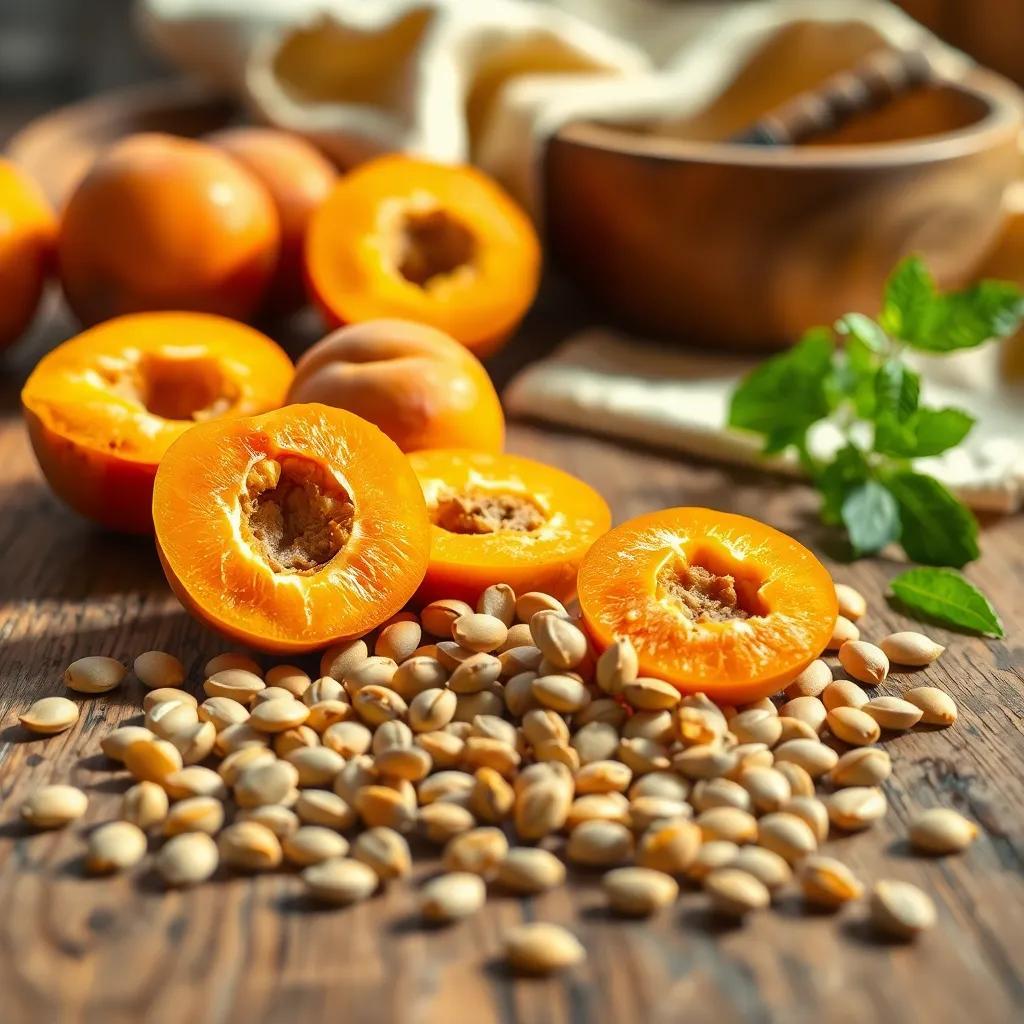Have you ever wondered if those tasty apricots we enjoy can pose a danger to our furry friends? It turns out that the seeds inside those juicy fruits hide some serious risks for dogs! Join me as we explore the startling facts about apricot seeds, their toxicity, and how to keep your beloved pet safe and sound.
Understanding Apricot Seeds and Their Risks to Dogs
Oh, apricot seeds! They might be a little unknown treasure for humans, but for our furry friends, they can spell trouble. Apricot seeds, or apricot kernels, are the pits found inside those tasty fruits we love. While they contain some health benefits for us, like a tasty snack or a source of nutrients, they pose important risks to dogs. So, let’s break down why these little seeds should stay away from our pups!
The danger lies in a compound called amygdalin found in apricot seeds.When dogs chew on these seeds, amygdalin turns into cyanide in their bodies, which is highly toxic. Even a small amount can lead to serious health issues for your dog. But wait, it gets more complicated!
Potential Risks of Apricot Seeds:
- Cyanide Toxicity: As mentioned, amygdalin converts to cyanide. This can cause cellular dysfunction, making it hard for their bodies to use oxygen.
- Variety Matters: Not all apricot seeds are created equal. Bitter seeds usually have higher amygdalin levels than sweet ones, so they’re more dangerous.
- Dog Size: Little pups are more vulnerable.A tiny dog can be affected by a much smaller amount than a large breed!
So, keep apricot seeds far away from your dog’s reach. Just like how we avoid certain foods for our health, we need to be aware of what’s safe for our pets.
Symptoms of Apricot Seed Poisoning in Dogs
Now that we understand the risks, let’s chat about the symptoms to watch out for if your pup gets into apricot seeds. Recognizing these signs quickly can make all the difference in keeping your furry friend safe!
When a dog consumes apricot seeds, they might show signs of cyanide poisoning.Here are some symptoms that you should keep an eye on:
Common Symptoms:
- Gastrointestinal Distress: this can include vomiting, diarrhea, and abdominal pain. Your dog might be uncomfortable and even refuse to eat.
- Neurological Issues: Keep an eye out for weakness, tremors, or even seizures.If your dog seems uncoordinated or disoriented, it’s time to act!
- Respiratory Problems: Look for rapid breathing, choking, or difficulty breathing. This can be really scary but is a critical sign of distress.
- Changes in Heart Rate: If you notice an irregular heartbeat or if your dog is lethargic and has pale gums, it’s a big red flag!
what to Do Next?
If your dog exhibits any of these symptoms, do not wait! Contact your veterinarian instantly. Early intervention can help your dog recover and avoid serious complications.
Remember, while apricot seeds might seem harmless at first glance, they can lead to a real pickle for our beloved pups. By staying informed and vigilant, we can help keep our furry companions safe and healthy!

Immediate Actions if Your Dog Ingests Apricot Seeds
Oh no! If you suspect your dog has eaten apricot seeds, it’s time to spring into action! The quicker you act, the better your pup’s chances of staying healthy.Here’s a straightforward action plan to guide you through this tricky situation.
Step-by-Step Actions:
- Stay Calm: First, take a deep breath. panicking won’t help you or your dog. Staying calm will help you think clearly and act quickly.
- Assess the Situation: Check to see how many seeds your dog might have eaten. If it’s just a couple, it’s still a good idea to call your vet. If you can, keep track of the time since ingestion.
- Contact Your Veterinarian: Don’t hesitate! Call your vet or an emergency vet clinic right away. let them know what’s going on, including how many seeds were eaten and any symptoms your dog is showing.
- Do Not induce Vomiting Without guidance: While some people might think it’s helpful to make your dog throw up, you should only do this under a vet’s advice. Certain situations can make inducing vomiting dangerous.
- Prepare for the Vet Visit: If your vet recommends bringing your dog in, gather any vital information, like how much your dog weighs and any other recent health issues. It’s also helpful to bring the apricot seeds or any packaging, just so the vet can see what they might be dealing with.
- Follow Veterinary Advice: Once at the clinic, your vet will likely perform a thorough examination and may induce vomiting if needed or administer activated charcoal to absorb the toxins. follow their guidance for aftercare at home.
By acting quickly and following these steps, you’re doing everything you can to keep your dog safe!
Factors Affecting Toxicity of Apricot Seeds for Different Dogs
Did you know that not all dogs are affected by apricot seeds in the same way? it’s true! Several factors can influence how toxic those pesky seeds can be, and understanding these can definitely help us protect our furry pals better.
Key Factors to Consider:
- Size and Weight of the Dog:
– Smaller dogs are at a higher risk. They have less body mass to absorb the toxins, so even a small amount of apricot seeds can be dangerous.- Larger breeds may tolerate more, but that doesn’t mean it’s safe for them either!
- Amount Ingested:
– The more seeds your dog consumes, the greater the risk. Just a few seeds can be harmful, especially for smaller dogs.
– Always err on the side of caution; if you know your dog snacked on some seeds, it’s best to check with a vet.
- Type of Apricot Seed:
– Bitter seeds contain higher levels of amygdalin (the bad stuff!), which converts to cyanide. These pose a greater risk compared to sweet apricot varieties.
- Overall Health of Your Dog:
– Dogs with pre-existing health issues, especially those affecting the liver or kidneys, may have a harder time processing toxins.
– A strong, healthy dog may handle small amounts better, but again, no amount is safe.
- Timing of Intervention:
– The quicker you get your dog help, the better the outcome. If you act fast, the vet may be able to minimize the effects of cyanide poisoning.
By understanding these factors, you can be more proactive and prepared to keep your pup safe from the risks of apricot seeds. Remember, whenever in doubt, consulting your veterinarian is always a smart choice!
Preventive Measures to Protect Dogs from Apricot Seeds
Prevention is always better than cure, right? When it comes to keeping our beloved dogs away from apricot seeds, a little vigilance goes a long way. here are some practical tips to help you ensure your dog stays safe from these toxic seeds.
Smart Prevention Strategies:
- Proper Disposal:
– Make sure to dispose of any apricot pits or seeds securely. Use dog-proof trash cans that your furry friend can’t rummage through.
- Educate Your Family:
– Ensure everyone in your household knows that apricot seeds are dangerous for dogs. This way, your family can help keep your pup out of harm’s way.
- Monitor Outdoor Activities:
– When out on walks or in the yard, keep an eye on your dog. Don’t let them dig through trash or scavenge for fallen fruit, especially in areas where apricot trees might be growing.
- Choose Safe Treats:
– When selecting dog treats, make sure they don’t contain any apricot seeds or similar toxic ingredients. Stick to treats from reputable brands that prioritize safety.
- Consult Your Vet:
– If you’re ever unsure about what foods are safe for your dog,always ask your veterinarian! They can provide guidance tailored to your pup’s specific needs.
By being proactive and implementing these simple measures, you can significantly reduce the risk of apricot seeds poisoning. Keeping our dogs happy and safe is the name of the game! plus,your furry friend will thank you with wagging tails and lots of love.

